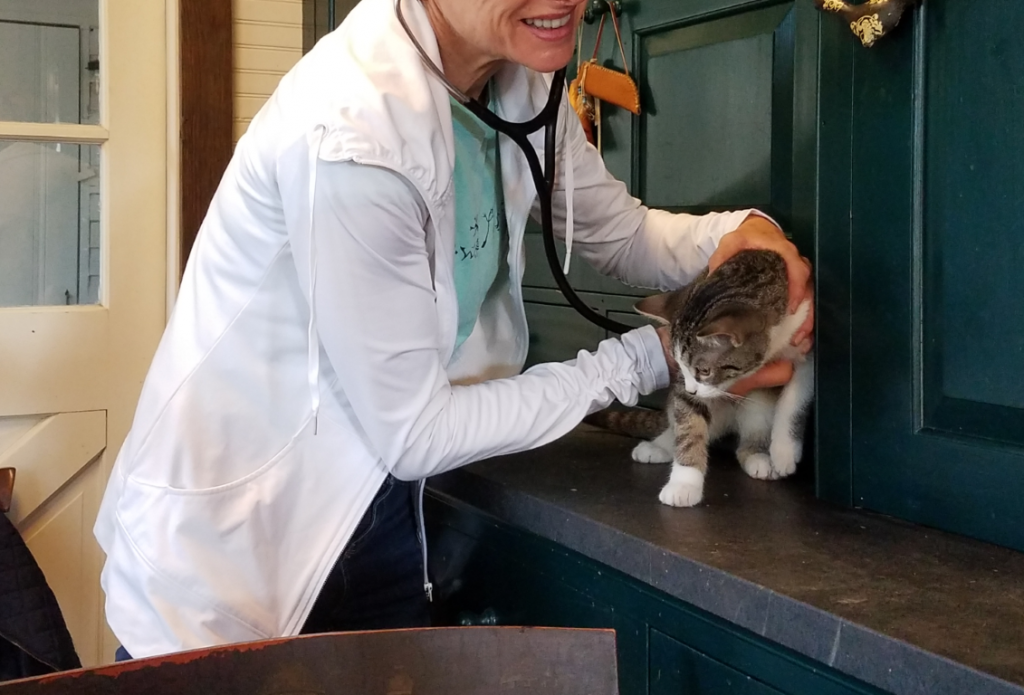Call Dr. Celeste Conn at 1 410-708-2608 to schedule an appointment
- Menu
- Home
- About Us
- » Meet Dr. Celeste Conn
- » Housecall Policies
- » Areas and Hours
- Services
- » Vaccinations
- » Wellness Checks
- » Diagnostics Services
- » Flea and Tick Control
- » Internal Medicine Consults
- » Dietary Counseling
- » Behavioral Counseling
- » Health Certificates
- Pharmacy
- Articles
- Resources
- » Puppy and Kitten Care
- » Senior Pet Care
- » Animal Rescue and Adoptions
- » Pet Health Care Library
- » Helpful Pet Care Links
- Gallery
- Contact
- » Schedule an Appointment
- » New Patient Info
- » Emergencies
- » Request Prescription Refill
Puppy and Kitten Care
Comprehensive exams for new puppies and kittens
The first thing you and your new puppy or kitten should do is meet with your veterinarian for an exam. This ensures that your new pet is healthy and doesn't have any birth defects or health issues.
For the first visit, plan on discussing with your veterinarian the following subjects
- Setting up a vaccination plan.
- Which foods your vet recommends, how much and how often to feed, and when to switch to adult foods (which varies by breed).
- Options for controlling fleas, ticks, and internal parasites like heartworms.
- Signs of illness to watch for during your pet's first few months. Puppies and kittens are susceptible to health risks and illnesses that need to be treated in the early stages.
- When you should spay or neuter your kitten or puppy.
- House training your puppy (we recommend crate training) or litter box training your kitten.
- Socializing your pet - proper socialization helps avoid future behavioral problems.
Puppy Care
So, you've puppy-proofed your home and brought your new puppy home from the breeder. It's time to introduce him to the family and other pets, and begin his training.
Kitten Care
If you open your heart and home to a kitten, then here are a few pointers (for raising him right).
Of course, everyone knows to feed kitten food. Using a growth formula through the first 8-10 months gives growing bones and muscles extra protein. Cats have a much higher protein requirement than do dogs or humans and that’s especially true for kittens. Kitten food must be labeled “Complete and Balanced Nutrition” because that implies it is appropriate for all life stages. Feed a variety of food, in both brand and consistency. Always feed from a metal or ceramic bowl. No plastic please! Once kittens are weaned, they no longer need milk. Some cats do like dairy products, and it’s ok to give it. Kittens are easily trained to a litterbox, and the general rule is one box per cat.
Just like children, kittens need to be socialized. Initially, they are taught species-specific behaviors by their mother. The queen teaches grooming, hunting and what limits are normal for roaming. Also, interaction with siblings teaches a kitten how to play. At about 8 weeks of age, kittens can go to their adoptive home. It is then that bonding with their human family is optimized. Successful incorporation into the household requires some loving care. Optimal socialization includes special handling like brushing, cleaning ears, trimming nails and brushing teeth. Handle cats paws every day so that cutting nails is no big deal. Put your fingers in your cat’s ears so if you need to medicate them he’s used to the sensation. Open the mouth and pretend to give the kitten a pill so that you can if you ever need to. I have also taken every kitten I’ve ever had for frequent car rides so that he’s not afraid of the car. Make lots of loud noises, have company over so kittens are neither shy nor scared. I travelled extensively with my Maine Coon cat who was unfazed by airport security or bumpy plane rides.
Again, like growing children, kittens need mental stimulation too. Keeping a youngster home alone all day is neither smart nor fair. Bored individuals of any species become destructive. Good toys are the interactive ones. Fishing poles with fur mice or feathers on the end give a kitten endless hours of satisfaction. Remember that cats need exercise. Provide playthings which keep a cat moving. The best playtime is that which is spent with a loving owner. Enjoy!
Call Dr. Celeste Conn at 1 410-708-2608 to schedule an appointment
The Visiting Veterinarian
Celeste Conn, VMD
1 410-708-2608
[email protected]Copyright 2024, The Visiting Veterinarian. All rights reserved.

